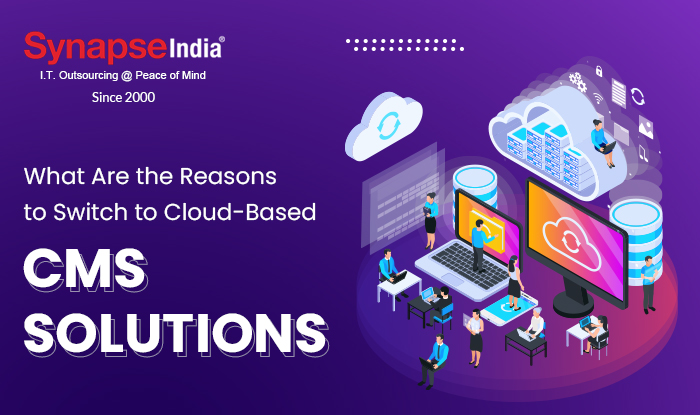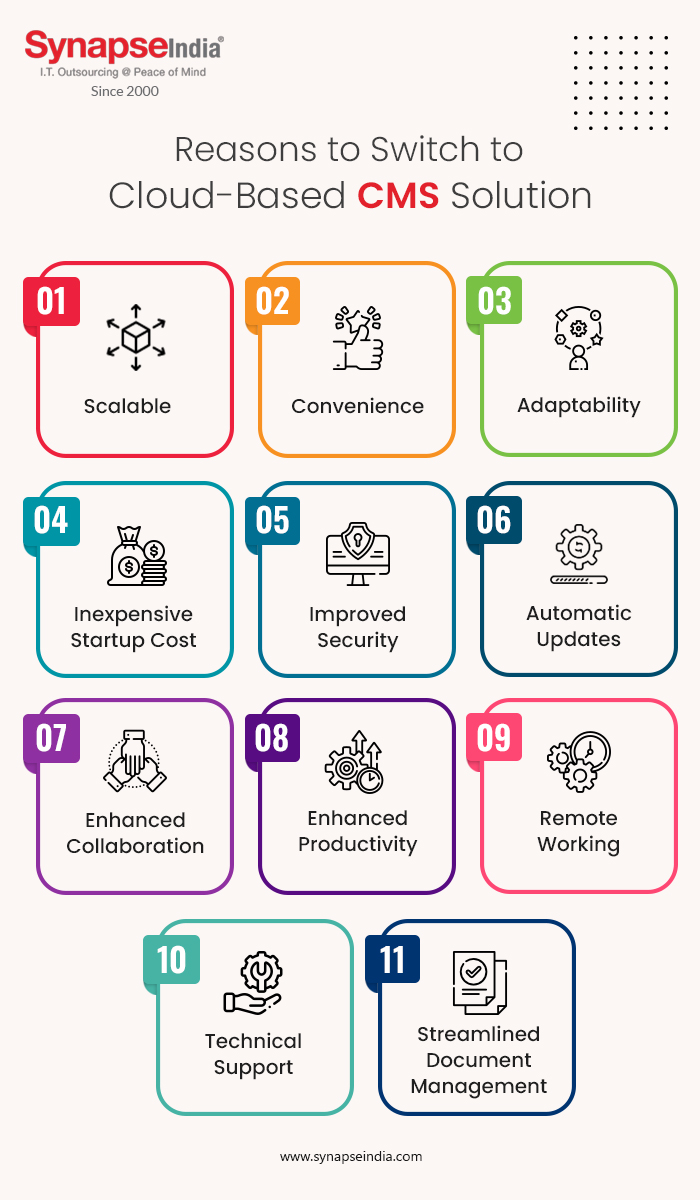 04 Oct 2022
04 Oct 2022“Many organizations these days prefer a cloud-based CMS solution. Majorly, because of the benefits it offers. It allows content creators to create, update and delete content as per their requirement.”

For organizations of all sizes, with various types of clients, a content management system (CMS) has developed from an esteemed comfort to a flat out need. These platforms assist organizations with making new content, keep up with existing content, and arrive at new business sectors.
A large number of organizations, nonetheless, still use on-premises CMS stages that burden their IT staff, content makers, and marketing specialists. These frameworks request such a lot of consideration and draw from so many organization resources that they can immediately become liabilities, rather than the effectiveness instruments they're expected to be.
In view of these limits, many organizations are thinking about switching from an on-premises legacy CMS to a cloud-based stage. A cloud CMS has similar usefulness as a conventional CMS, permitting creators to make, update, and erase content depending on the situation.
The principal contrast is that, while the site owner typically deploys a legacy CMS, an outsider host manages with those obligations for a cloud-based CMS. Cloud suppliers, for example, Google Cloud CMS or Amazon Web Services, can have CMS stages for hundreds or thousands of organizations while applying assets that on-premises stages can't coordinate.

In-house CMS solutions can require acquisition of permit, installation, testing, and deployment. Dissimilar to cloud-based CMS whose main expense is membership charges. Your cloud supplier is answerable for deployment and support. You can have confidence knowing at whatever point you want extra assets or help; your cloud supplier is prepared and accessible.
With an in-house CMS, a copywriter is confined to explicit tasks. Some in-house solutions have network availability and can be accessed when important. On the other hand, it is easy to access cloud-based solutions from anywhere and at any time.
For some in-house solutions, their models depend on a single setup. They are made to fit any plan of action with no space for customization. As a business you are left contemplating whether you will get upgrades or not. This limits your clients' capacity.
This will cost you time and money. For cloud-based solutions, content makers can make content for specific markets, geo areas, and devices. With this versatility, stakeholders can use content to beat out the opposition.
A cloud-hosted CMS that can't be scaled accordingly only gives a short-term solution. As your organization targets new business sectors, geo areas and leverage content for development, your CMS should likewise be versatile to meet your development needs.
Hacking news, ransomware, and fraud makes headlines every day. Content makers should guarantee their delicate content remains safe and secure.
For an in-house CMS, security is entrusted to inside staff or project workers who can cost your organization dearly. A cloud-based CMS security is entrusted to your cloud supplier. They routinely screen and update security conventions guaranteeing your sensitive data is secure.
One of the greatest costs related with an on-premises CMS is the need to maintain software updates. Clients should buy these updates through the distributors, install them, test them, and ensure that they work with the current content. These tasks can require a great many dollars and many hours to finish.
The suppliers for cloud-based CMS stages regularly incorporate software updates with the membership charges. The suppliers likewise handle the testing and deployment of updates to guarantee that their clients can utilize the most recent feature, while keeping up with their internet-based presence.
Each enterprise-level content, as well as generally little to medium-sized organizations, depends on a group of content makers, editors, and supervisors to ensure that their content is on time, on-brand, and on message. These endeavors require an elevated degree of correspondence and coordinated effort among the various colleagues.
Cloud-based CMS software frequently incorporates version control, with the goal that editors can investigate different emphases of the content and conclude which aspects they need to incorporate. Likewise, the highly accessible nature of a cloud CMS stage permits colleagues to deal with projects from anyplace, at any time, alone or in groups.
At the point when content creators should confront the inherent limitations found in customary CMS platforms, their efficiency and imagination can be seriously hampered. They should invest their energy in "workarounds" in view of the limits of their devices, as opposed to conveying the outcomes they need (and their clients request).
With the upgraded availability and collaboration tools that cloud-based CMS packages offer, content makers can see their endeavors compensated, and their efficiency improved, frequently with less exertion than they'd have to apply while working with conventional platforms.
Numerous customary on-premises CMS stages expect that colleagues who work with those systems accomplish that work on-premise. This necessity might be because of absence of intranet capacities, absence of security resources, or absence of stage adaptability. This prerequisite additionally powers colleagues to waste their time while driving to the workplace, which converts into lost time and efficiency.
The accessibility of a cloud-based CMS implies that content makers can telecommute, from home or any distant area. This degree of openness makes for more joyful, more productive colleagues, as well as lower the cost of the project.
An on-premises CMS makes it the responsibility of internal IT staff to perform tasks like maintenance and support. These undertakings remove them from achieving other crucial tasks, as well as keeping them from improving and updating the current systems and platforms.
But when an organization has a CMS in the cloud, the duty of performing all the technical support tasks falls on the shoulders of dedicated employees. These exceptionally prepared professionals handle the errand of maintaining the CMS, while the client's IT staff can focus on their own business.
Content creation isn't the main undertaking that includes CMS platform users. A significant errand includes dealing with the information that an enterprise makes, as well as following the metadata that depicts the reason and content of that information. While on-premises CMS solutions can deal with that content, these stages do not have the capability to permit clients to augment their use of data.
A cloud-based solution can deal with the content, populate the metadata, and apply strong search functionality. This power permits clients to find the content they need when they need it and utilize that content to its most extreme impact.
Taking care of the advantages of a cloud-based CMS solution, you have a long list of reasons to do the switch. It won't just help your organization, but your clients will adore you for creating content that serves their needs. Leverage cloud for your content management system!


